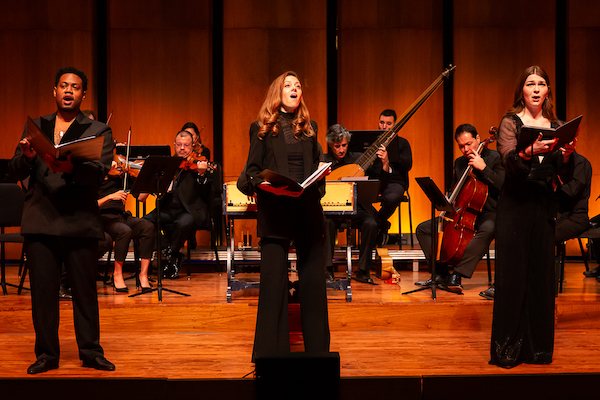Ars Lyrica serves up a delightful Handel rarity

For a Baroque group with Handel on its mind, Messiah might be the obvious vehicle as Easter approaches. Houston’s Ars Lyrica on Sunday went the opposite way, turning in a zesty performance of Handel’s Clori, Tirsi e Fileno, a secular cantata that ends with a paean to liaisons over love.
Clori dates back to 1707, when the 22-year-old Handel left his native Saxony and settled in Rome to absorb the Italian musical style. He must have been a quick learner: The score abounds in the alluring melodies and rousing coloratura that were Italian opera’s calling cards—and became his.
The cantata centers on a shepherdess, Clori, who is stringing along two suitors, Tirsi and Fileno. Clori at first appears to be gravitating toward Fileno. In the exuberant duet that closes the cantata’s Part 1, they liken one another’s attractions to heaven’s beauty and the sun’s rays. Tirsi responds with the burst of raging fioritura that helps launch Part 2, and Clori eventually reveals that mere indecision isn’t her issue.
In the score’s most mellifluous aria, “Amo Tirsi,” she declares that her “special talent” is “feigning fidelity”: She explains to Tirsi that she can love him while making Fileno think she loves him.
Catching on to her wiles, Tirsi and Fileno ultimately decide not to let their emotions get fired up: Their affections will be guided by “caprice, not love.” The finale is a cheery trio proclaiming that life without romance is impossible, and a little suffering now and then just goes with the territory.
While Ars Lyrica didn’t give Clori a staging as such, it left a space across the front of the stage in the Hobby Center for the Performing Arts’ Zilkha Hall. That gave the cast room for a little play-acting—such as Tirsi’s storming off at the end of his first scene.
But it was really up to the singing to bring the characters to life, of course, and Ars Lyrica treated Handel to a three deft and dynamic voices.
Countertenor Key’mon Murrah, winner of Houston Grand Opera’s 2021 Eleanor McCollum Competition, played Clori, singing with a fluency that paid off in gracefully turned melodies, dulcet trills and vigorous coloratura.
When Clori’s emotions flared up—as in “Barbaro! tu non credi,” a mood-swing aria veering between agitation and plaintiveness—Murrah’s voice took on a trace of pungency that accented the message. But his gentler, sweeter tones were potent in their own way, and his finesse made the lilting “Amo Tirsi” one of the afternoon’s highlights.
Soprano Lauren Snouffer has been a compelling presence with HGO in roles as different as Cherubino in Mozart’s The Marriage of Figaro and Sister Constance in Poulenc’s The Dialogues of the Carmelites.
As Tirsi, she revealed yet another musical persona: the coloratura fireball.
In the more easygoing two arias that open Clori, Snouffer’s voice boasted equal parts brightness and warmth, and she dispatched baroque ornaments with a lightness that enhanced the music’s charm.
But when anger boiled over in Part 2, Snouffer let loose with salvos of full-throated, sharply defined fireworks that nearly stole the show. Then she eased up again for the graceful “Un sospiretto,” a salute to the power a woman can exert with a mere sigh.
It’s relatively rare to come across a singer who bills herself as a contralto, but Cecelia McKinley does that, and as Fileno she showed why: Her voice was full and rich, dipping easily and resonantly to its lower reaches.
McKinley brought ample tone and spirit to aria after aria, and even when the accompaniment was sketched in lightly, she made the music sound generous. She gave special soulfulness to “Povera fedelta,” a lament about the absence of faithfulness, but she also matched Murrah’s vigor in the duet that ended Part 1.
The orchestra, led by harpsichordist and Ars Lyrica artistic director Matthew Dirst, by and large played with zip and transparency.
The group complemented the singers in the lyrical moments and helped propel the energy of the excited ones. Even though violone player Deborah Dunham had to bow out at the last minute because of illness, the group sounded sturdy when it needed to.
And concertmaster Stephen Redfield stepped out with aplomb in the violin obbligato of Clori’s “Barbaro” aria, where he turned on a dime between firing off barrages of double stops and sketching in plaintive lyricism. He helped the orchestra tell the story.
Ars Lyrica will perform works by Rossi, Buxtehude, Bach and Rameau on May 13 at Hobby Center for the Performing Arts. arslyrica.org